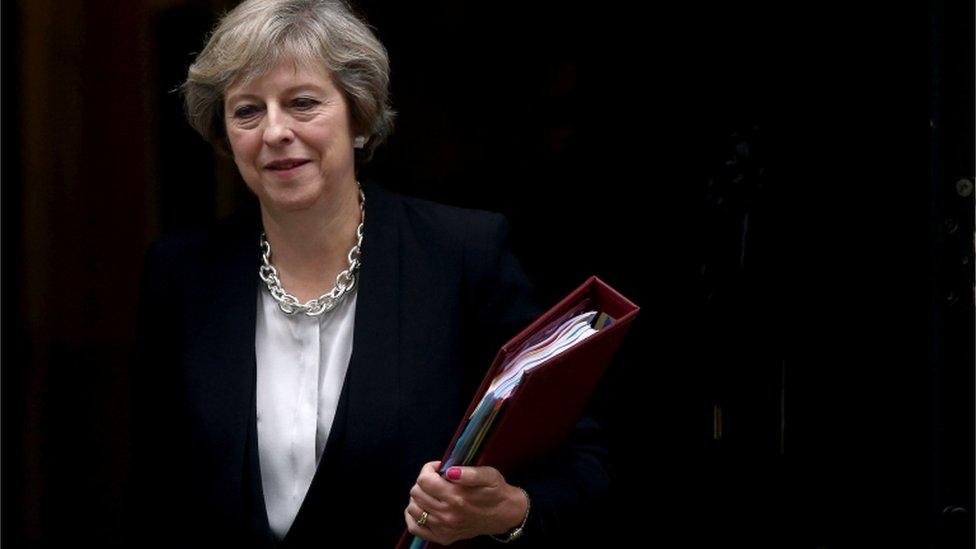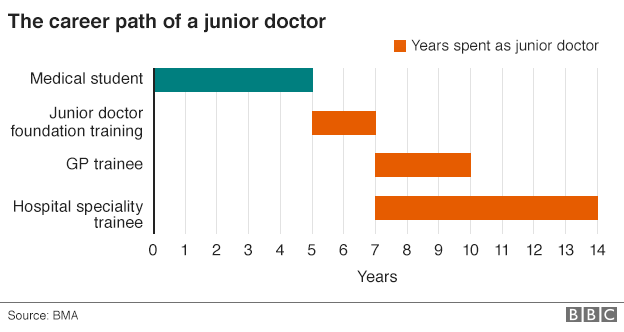Junior doctors’ dispute – what next?
- Published

An anonymous courtroom rather than a noisy picket line is likely to be the location for the next chapter in the junior doctors' dispute.
A two-day hearing at the High Court on 19 and 20 September will consider a challenge to the controversial employment contract, brought by doctors' group Justice for Health.
It will see a vigorous testing of the arguments for and against the changes in England planned by the government.
The legal argument will cut through the rhetoric and acrimonious exchanges about doctors' weekend pay, patient safety and the seven-day NHS.
Justice for Health hope its lawyers can challenge the government's power to impose a new contract and the claims the changes are essential to deliver improved services in hospitals at weekends.
It is hard to assess the legal action's chances of success.
Whitehall sources, while careful not to try to second guess the court, indicate they are reasonably confident the government's case will prevail.
But if Justice for Health win, then a major spanner will be thrown in the works, even if the government appeals.
The contract is due to be introduced in English hospitals in the first week of October.
The saga will move from the High Court to the British Medical Association's central London office on 24 September.
There, the junior doctors' committee (JDC) will meet to review the latest developments.
Crucially, it will be a newly elected committee and the new members include Dr Ben White and Dr Nadia Masood, two of the founders of Justice for Health.
Support remains strong
Its hard to predict what stance the JDC will take, though it seems highly unlikely that the support for industrial action will have waned.
The current chair, Dr Ellen McCourt, may face a challenge. A new-look JDC will add another layer of uncertainty.

The prime minister has accused junior doctors of "playing politics"
The BMA appeared to be on the back foot this week.
Having announced an escalated set of strikes with reduced notice for hospitals to prepare, it was hit by a wave of criticism from senior levels of the medical profession.
That led to the cancellation of the planned five-day strike for September.
With Dr McCourt admitting that thousands of doctors had been in touch over the issue, some concluded there had been a revolt across the grassroots of the BMA.
But sources at the JDC say it was members warning their hospitals had too little time to prepare for the strikes and that underlying support for future action has not diminished.
The next strike action, over five days, is set to start on 5 October - the day the new contract is put in place for some parts of the medical profession.

The BMA believes there is enough notice for hospitals to make their contingency plans and move consultants to cover striking junior doctors for emergency care.
Members, it is said, will assess whether hospitals can provide a safe service and report back to the BMA.
But NHS leaders in England are already warning that, even with a month's notice, hospitals are going to struggle to organise cover for striking doctors.
Pressure on the BMA to rethink will no doubt grow as the first strike day gets closer.
Simon Stevens, in a speech to an NHS conference, said: "We should be in no doubt that it will not be possible to ensure there will be no harm to patients, even with several weeks' notice, if we are talking about multiple weeks of up to 50,000 doctors not being available for emergency care."
There is no doubt some junior doctors are in two minds over whether to walk out for five consecutive days.
Those interviewed on a live debate organised by the BBC's Victoria Derbyshire programme were divided on the merits of strikes lasting several days and affecting all forms of care.
But they were in agreement in condemning the new contract which ministers want to introduce in England and in supporting a continuing campaign.
The Guardian has quoted a senior figure in the BMA saying the organisation is in a "mess" and the battle with the government "lost".
The leadership, according to the unnamed source, fears that if it fails to support the junior doctors, they will break away from the BMA.
The dispute has taken many twists and turns and dragged on for more than a year.
But the next few weeks look set to be among the most critical yet.
- Published5 September 2016
